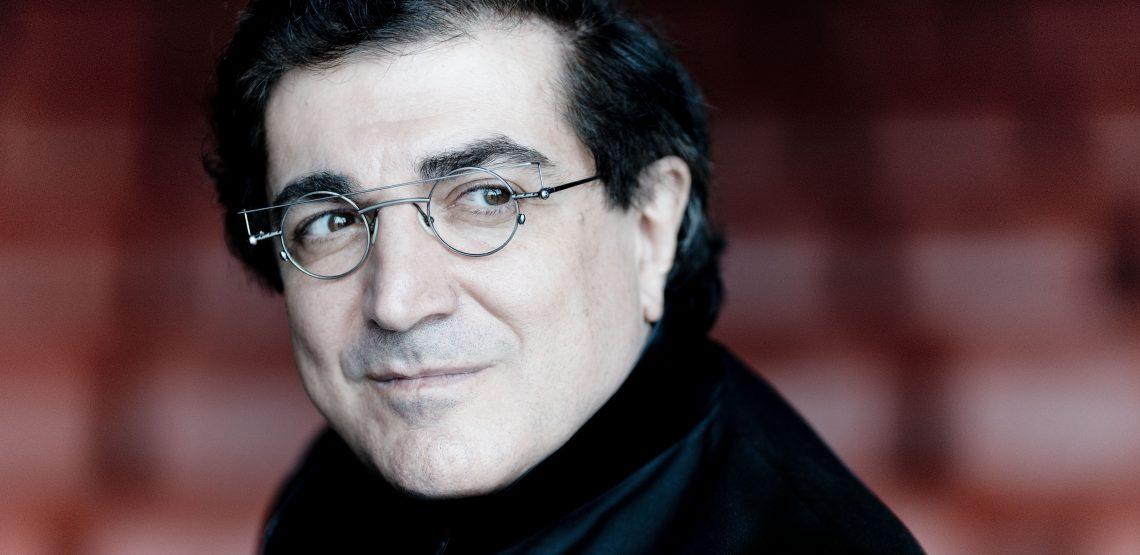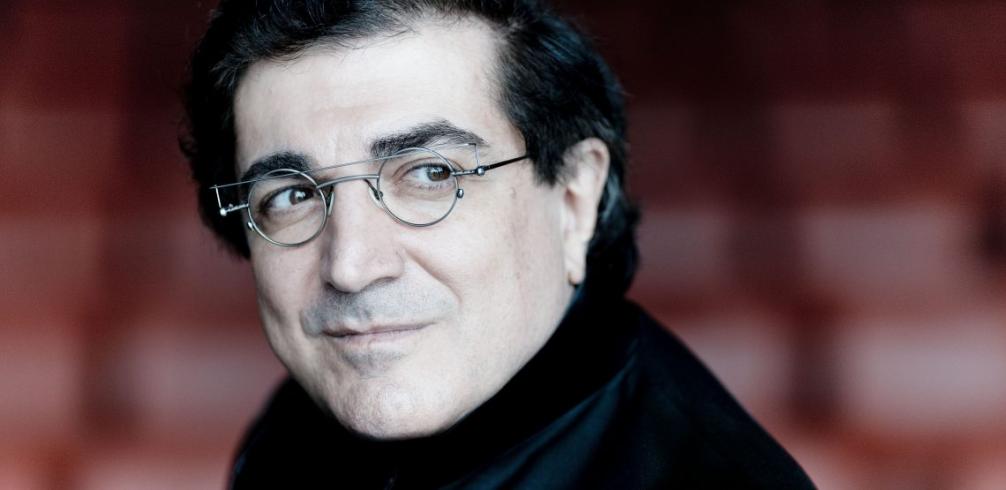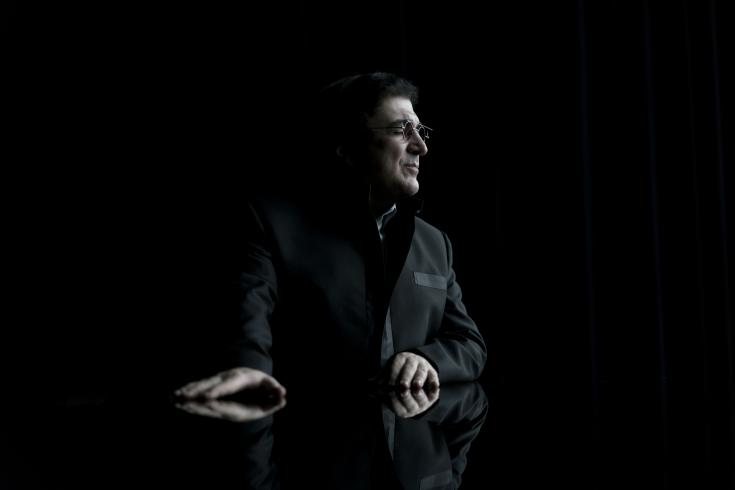Sergei Babayan
Piano

Sergei Babayan will make his Phillips Music debut with works by Ryabov, Bach, Chopin, and Rachmaninoff.
Program
Hailed by Le Figaro for his “unequaled touch, perfectly harmonious phrasing, and breathtaking virtuosity,” Armenian-American pianist Sergei Babayan brings deep understanding and insight to a diverse repertoire, which includes a performance history of 54 concertos. As a soloist, Babayan has collaborated with the likes of Martha Argerich, Yuri Temirkanov, and Neeme Jarvi. Babayan’s most recent recording of Prokofiev’s Piano Concerto No. 5 with the Mariinsky Orchestra was released in 2016 to great acclaim. Babayan’s experience has taken him to preeminent venues such as Salle Gaveau, Wigmore Hall, Carnegie Hall, Herkulessaal, and Victoria Hall. This concert will include works by Ryabov, Bach, Chopin, and Rachmaninoff.
PROGRAM:
VLADIMIR RYABOV (b. 1950)
Fantasia in C minor, Op. 21, in memory of Maria Yudina
Introduzione
Sonata I
Marcia Funebre
Sonata II
Capriccio
JOHANN SEBASTIAN BACH (1685-1750)
From the Klavierbüchlein for Wilhelm Friedemann Bach
Prelude in C Major, BWV 939
Prelude in C minor, BWV 999
Menuet-Trio in G minor, BWV 929
Prelude in E Major, BWV 937
Sinfonia in E-flat Major, BWV 791
Prelude in D minor, BWV 926
Prelude in C-sharp Major, BWV 872
Prelude in F Major, BWV 901
INTERMISSION
FRÉDÉRIC CHOPIN (1810-1849)
Polonaise in C-sharp minor, Op. 26
Valse in C-sharp minor, Op. 64, No. 2
Barcarolle in F-sharp major, Op. 60
SERGEI RACHMANINOFF (1873-1943)
Étude tableaux No. 5 in E-flat minor, Op. 39
Moments musicaux in E-flat minor, Op. 16, No. 2
Moments musicaux in C Major, Op. 16, No. 6
Please note that this concert takes place at the Cosmos Club, 2121 Massachusetts Ave., NW.
About the Artist
Hailed for his emotional intensity, bold energy, and remarkable levels of color, Sergei Babayan brings a deep understanding and insight to a stylistically diverse repertoire, which includes a performance history of 54 concertos. Le Figaro has praised his “unequaled touch, perfectly harmonious phrasing, and breathtaking virtuosity.”
Highlights of the 2016/2017 season included recitals in Montreal, Vancouver, Lawrence, Kansas, St. Paul, Minnesota, Durham, Charleston, and Evanston, Illinois; duo recitals with Daniil Trifonov in Princeton New Jersey, and Sarasota, Florida; chamber music performances in Los Angeles, and Fort Worth; and a return again to the Verbier Festival for a recital in August 2017.
In the spring of 2016, Babayan’s recording of Prokofiev Piano Concerto No. 5 with the Mariinsky Orchestra conducted by Valery Gergiev was released on the Mariinsky label to great acclaim.
In the 2015/2016 season, Babayan’s schedule included concerto performances with the Rotterdam Philharmonic conducted by Valery Gergiev and with the Camerata Israel in Tel Aviv; performances at the “Progetto Martha Argerich” in Lugano, Switzerland; at the Edinburgh Festival in Scotland, and at Bad Kissengen, Germany; recital and concerto performances in duo with Daniil Trifonov at the Mariinsky Theater in St. Petersburg, Russia; a return to Wigmore Hall in London; recitals and chamber music performances in Los Angeles, Atlanta, East Lansing, and Columbia, South Carolina among others.
Babayan has collaborated with such conductors as Yuri Temirkanov, Neeme Järvi, Hans Graf, David Robertson, Tugan Sokhiev, and Kazimierz Kord, among others. Over the years, Babayan has performed with Valery Gergiev numerous times to great critical acclaim, including appearances at the International Festival “Stars of the White Nights,” the Moscow Easter Festival, the Barbican with Gergiev conducting the London Symphony Orchestra, in St. Petersburg’s Mariinsky Theatre, the Great Hall of the Moscow Conservatory, Théâtre des Champs-Élyseés in Paris, at the Salzburg Festival, and at the Rotterdam Philharmonic-Gergiev Festival where Babayan was Artist-in-Residence.
Babayan performs with the world’s foremost orchestras, including the London Symphony, Cleveland Orchestra, Orchestra of the Mariinsky Theatre, Warsaw Philharmonic, BBC Scottish Symphony Orchestra, Orchestre National de Lille, Detroit Symphony Orchestra, Baltimore Symphony Orchestra, and the New World Symphony.
His engagements and tours have brought him to preeminent international concert venues including Salle Gaveau in Paris, Wigmore Hall in London, Carnegie Hall in New York, the Warsaw Philharmonic, Severance Hall in Cleveland, Mariinsky Theatre in St. Petersburg, Herkulessaal in Munich, Liederhalle in Stuttgart, Meistersingerhalle in Nurnberg, Konzerthaus in Berlin, Brahms-Saal in Karlsruhe, Beethovenhalle in Bonn, Philharmonie Hall in Essen, Rudolfinum-Dvorak Hall in Prague, and Victora Hall in Geneva.
Born in Armenia into a musical family, Babayan began his studies there with Georgy Saradjev and continued at the Moscow Conservatory with Mikhail Pletnev, Vera Gornostayeva, and Lev Naumov. Following his first trip outside of the USSR in 1989, he won consecutive first prizes in several major international competitions including the Robert Casadesus International Piano Competition (renamed the Cleveland International Piano Competition), the Hamamatsu Piano Competition, and the Scottish International Piano Competition.
Notes
Vladimir Ryabov, Fantasia in C minor, Op. 21
The Russian composer and pianist Vladimir Ryabov was born in Chelyabinsk in 1950 and studied at the Moscow Conservatory where he was expelled twice for his non-conformist attitudes. He continued his studies at the Gnessin Institute in Moscow with Aram Khachaturian. After teaching composition at conservatories in Leningrad (now St. Petersburg) and Sverdlovsk, he toured internationally as a concert pianist for several years and performed in a 1992 documentary about Chopin. In 1991 he had a breakthrough as a composer when he won the International Prokofiev Composers’ Competition. Ryabov has written in a variety of forms including chamber music (five string quartets), sacred choral music and works for organ, as well as symphonies, the fourth of which (1983) is dedicated to the memory of Brahms. Written in E minor, it is a kind of deconstruction of ideas from Brahms’s own Fourth Symphony in the same key but reinterpreted in a decidedly modern idiom, albeit a tonal one. The Fantasia, Op. 21 was written in memory of the great pianist Maria Yudina (1899–1970) and dates from 1983, the same year as the Fourth Symphony. It, too, makes extensive allusions to earlier music including the gestures of the great Romantic piano composers (especially Liszt and Chopin), Mozart, Russian Orthodox chant, and one theme that is ascribed in a footnote in the score to Yudina herself. Ryabov’s familiarity with music of the great Russian school of Rachmaninoff and Scriabin is also apparent in several places and in the virtuoso style of the whole work. Though the thematic material is drawn from a bewildering range of sources, Ryabov’s music has a coherence and sense of direction that is entirely individual. Ryabov has described the language of his compositions as a “combined style of a broad spectrum,” drawing on traditional music and the works of 18th and 19th-century composers for inspiration–but not as a kind of pastiche. Khachaturian described the work of his erstwhile pupil as follows: “Vladimir Ryabov’s music is unusually beautiful. In his works there is that rare combination of philosophical depth and passionate, almost romantic emotionality.”
Johann Sebastian Bach, Selections from the Klavierbüchlein for Wilhelm Friedemann Bach
The Klavierbüchlein (“Little Clavier Book”) for Wilhelm Friedemann Bach was started in Cöthen in 1720 when Bach’s eldest son Wilhelm Friedemann (1710– 1784) was nine years old. Including a preface on reading clefs and the correct performance of ornaments, it amounted to a comprehensive teaching course for an aspiring keyboard player made up of works–in ascending order of difficulty–that are mostly by J.S. Bach himself. It also includes music by Telemann, Gottfried Stöltzel and Johann Christoph Richter. The pieces by Bach include several preludes from The Well-Tempered Clavier, the two-part Inventions and three-part Sinfonias, organ chorale preludes, and a number of short keyboard preludes written specially for the collection. Bach composed several other sets of short keyboard pieces that were not included in the original Klavierbüchlein though they may well have been intended for a similar purpose. All of them transcend what might be expected of a piece for teaching: this is music that goes far beyond any pedagogical function. The earliest manuscript of the Klavierbüchlein, much of it in J.S. Bach’s own hand and signed at the end by Wilhelm Friedemann, is one of the musical treasures of the Beinecke Library at Yale University.
Fryderyk Chopin,
Polonaise in C-sharp minor, Op. 26
Valse in C-sharp minor, Op. 64, No. 2
Barcarolle in F-sharp Major, Op. 60
Chopin’s Polonaise in C-sharp minor was first published in 1836 as one of a pair of Polonaises dedicated to the Austrian composer Josef Dessauer. Marked Allegro and Appassionato at the opening, this is a fiery and dramatic work with a central section in D-flat Major that is a complete contrast to the turbulence of the outer sections. The Valse in C-sharp minor is the second of the pair published as Op. 64 (its companion is the so-called “Minute Waltz”). Dedicated to Baroness Charlotte de Rothschild (to whom Chopin had already dedicated the F minor Ballade), it is a work of quiet melancholy illuminated by occasional rays of hope. It is a wonderful example of Chopin’s ability to create profoundly expressive miniatures.
Dating from two years earlier, the Barcarolle was composed in the summer of 1845. Chopin never went to Venice (the closest he got was Genoa) but the inspiration for this piece may have come from works such as the Venetian Gondola Song in Mendelssohn’s first set of Songs without Words which he used to give his pupils to play. Rossini’s Guillaume Tell–for which Chopin joined in the standing ovation when he saw it Paris–also contains a barcarolle. One of Chopin’s last major piano compositions, it was described by Hugo Leichtentritt as “a work of bewildering beauty.” Chopin’s near-contemporaries were quick to take it up: Clara Schumann, Hans von Bülow, and Saint-Saëns all included it in recitals, and Carl Tausig–a Liszt pupil–even invented a fanciful programmatic description for it in which he imagined two lovers meeting secretly in a gondola. Another enthusiast for the Barcarolle was Friedrich Nietzsche. He heard it played by von Bülow in 1880 and wrote that “Chopin has a blissful moment in his Barcarolle, expressed in sound in such a way that the gods themselves could, on hearing it, desire to spend long summer evenings lying in a boat.” Brahms edited the work for Breitkopf & Härtel, Debussy loved it, and Ravel described it as “magical.” Among later composers, Olivier Messiaen wrote in his Traité of the rich, resonant harmonic language of the Barcarolle influencing his own piano style–a century after Chopin wrote this piece. What matters even more than its importance to later composers is its originality, and its “bewildering beauty.”
Sergei Rachmaninoff,
Étude-tableaux No. 5 in E-flat minor, Op. 39
Moments musicaux in E-flat minor, Op. 16, No. 2
Moments musicaux in C Major, Op. 16, No. 6
Rachmaninoff composed his second set of Études-tableaux (Op. 39) in 1916–17 and it was to be his musical farewell to Russia: he left the country for good after the October Revolution in 1917. The E-flat minor Étude-tableaux is based on a noble, serious theme heard at the very start over throbbing repeated chords. Marked Appassionato, the piece builds towards a tumultuous climax before ending quietly. The six Moments musicaux were composed in October–December 1896 and though the set was written because Rachmaninoff was short of money at the time, these pieces are some of the composer’s finest piano works of the period and may have served as preliminary studies for the Preludes that were soon to follow. The second and sixth pieces in the set are both written in the manner of nineteenth-century études. While the E flat minor piece is glittering and often delicate, the C major Moment Op. 16 No. 6 is a brilliant and flamboyant piece that demands barnstorming virtuosity.
Nigel Simeone, 2017

